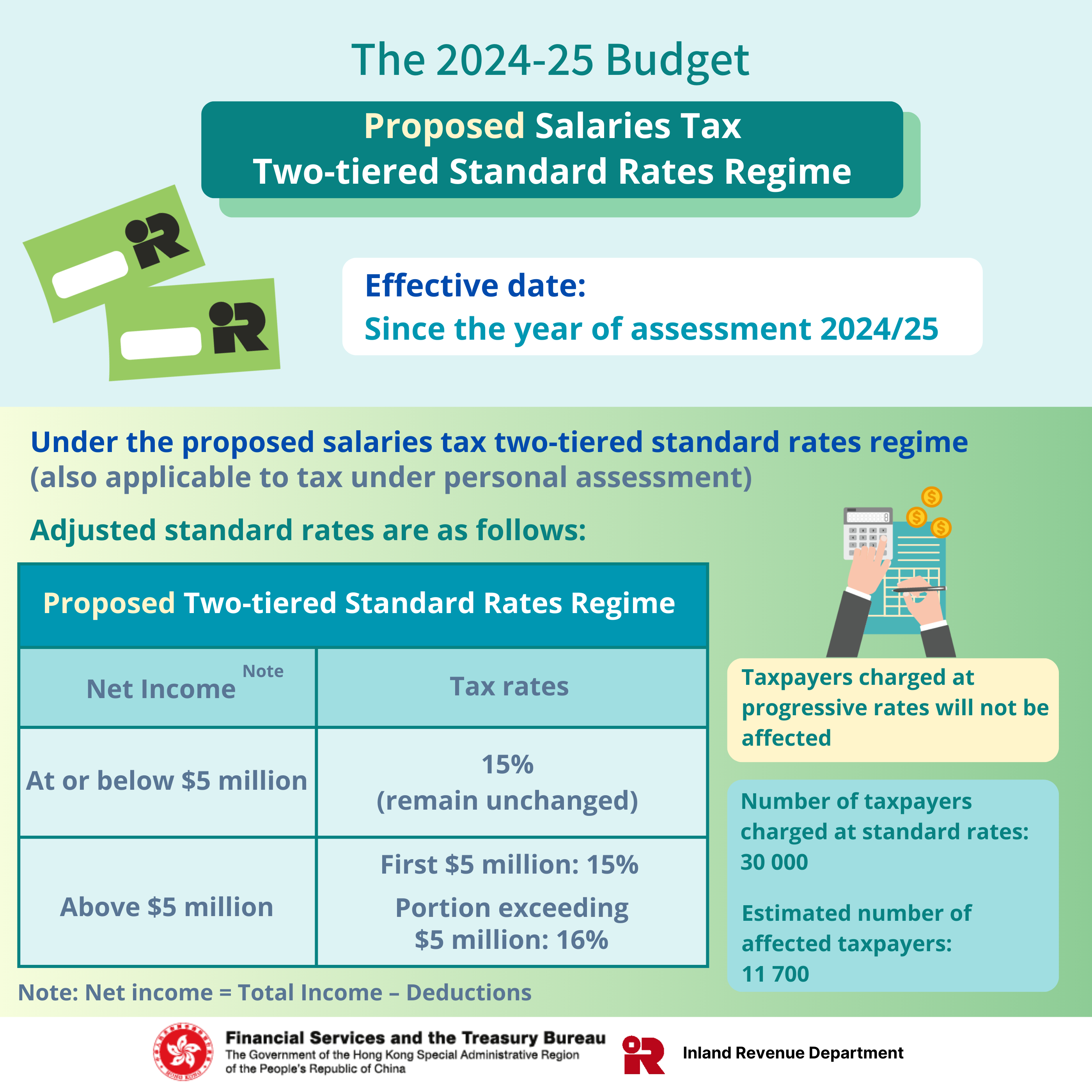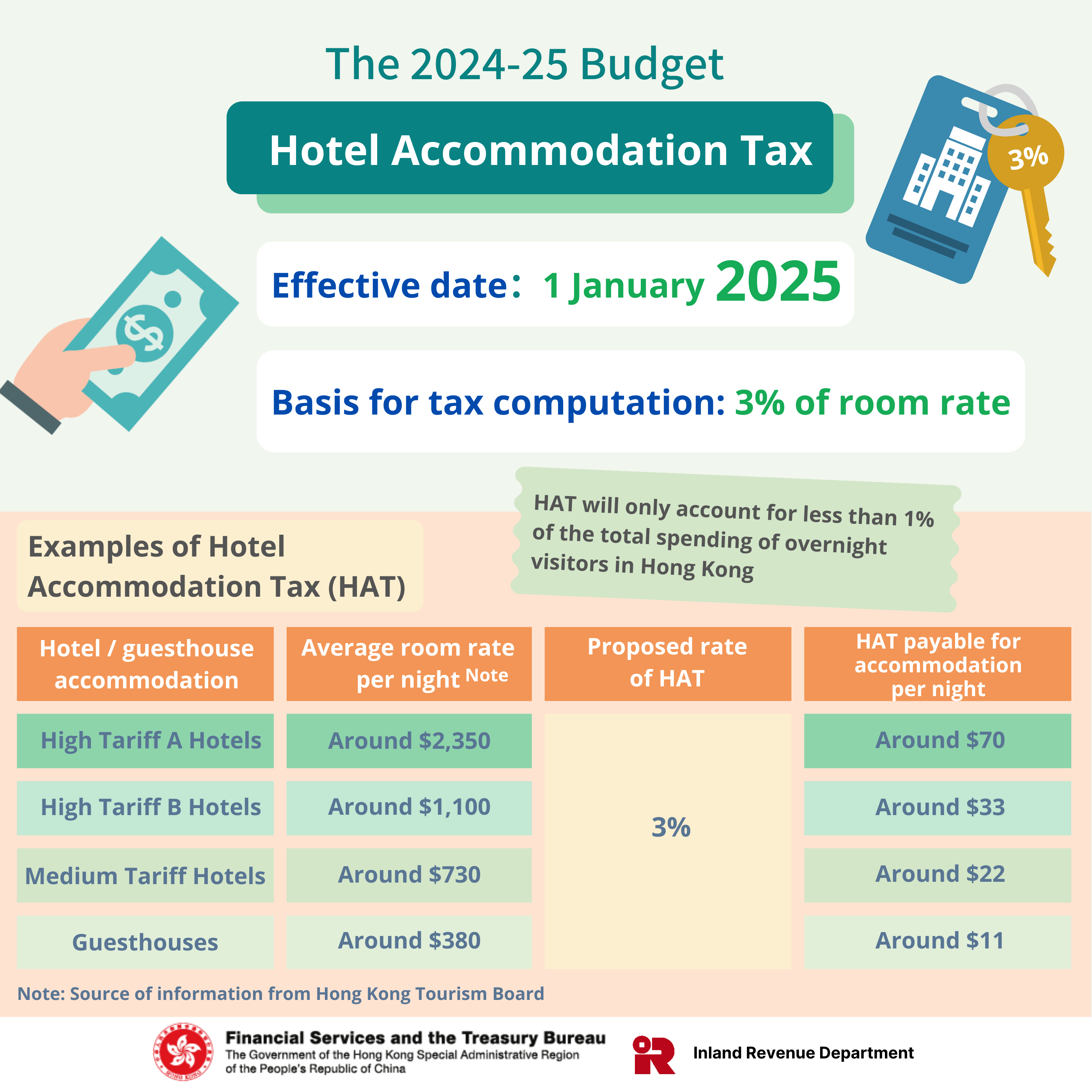2024-25 Budget – Tax Measures
In his 2024-25 Budget, the Financial Secretary proposed the following measures:
- Reducing profits tax, salaries tax and tax under personal assessment for the year of assessment 2023/24 (The relevant legislation was passed by the Legislative Council and gazetted on 31 May 2024.)
- Implementing a two-tiered standard rates regime for salaries tax and tax under personal assessment (The relevant legislation was passed by the Legislative Council and gazetted on 31 May 2024.)
- Providing tax deduction for lease reinstatement costs
- Removing the time limit for claiming industrial and commercial building allowances
- Increasing business registration fees and waiving the business registration levy for 2 years
- Resuming the collection of hotel accommodation tax
- Cancelling all demand-side management measures for residential properties
- Waiving stamp duties payable on the transfer of real estate investment trust units and the jobbing business of option market-makers
The above measures have to be implemented through legislative amendments. Highlights of the measures and implementation details are set out in the following paragraphs. Answers to frequently asked questions (FAQ) and illustrative examples showing how the proposed measures would reduce taxpayers’ salaries tax and tax under personal assessment are also provided. It should be stressed that details of the measures are subject to change during the legislative process.
You may use the Tax Calculator provided in GovHK to calculate your salaries tax and tax under personal assessment.
Reducing profits tax, salaries tax and tax under personal assessment for the year of assessment 2023/24
The Financial Secretary proposed a one-off reduction of profits tax, salaries tax and tax under personal assessment for the year of assessment 2023/24 by 100%, subject to a ceiling of $3,000 per case. The relevant legislation was passed by the Legislative Council and gazetted on 31 May 2024.
For profits tax, the ceiling of the tax reduction is applied to each business. For salaries tax, the ceiling is applied to each individual taxpayer; but for married couples jointly assessed, the ceiling is applied to each married couple (i.e. capped at $3,000 in total). For personal assessment, the ceiling is applied to each single taxpayer or married person who elects for personal assessment separately from his/her spouse. If a taxpayer elects for personal assessment jointly with his/her spouse, the tax reduction is capped at $3,000 for the married couple.
The tax reduction is not applicable to property tax. Individuals with rental income, if eligible for personal assessment, may be able to enjoy such reduction under personal assessment.
A taxpayer who is separately chargeable to salaries tax and profits tax can enjoy tax reduction under each of the tax types. For a taxpayer having business profits or rental income and electing for personal assessment, the reduction will be based on the tax payable under personal assessment. It might be different from the amount of tax reduction he/she would get if he/she was not assessed under personal assessment. The exact position will need to be evaluated case by case.
To elect for personal assessment, eligible taxpayers should complete Part 7 of his/her tax return for individuals (BIR60) for the year of assessment 2023/24. Individuals having salaries income only, but no business profits and rental income, need not elect for personal assessment.
The reduction will reduce taxpayers’ amount of tax payable for the year of assessment 2023/24. Taxpayers should file their profits tax returns and tax returns for individuals for the year of assessment 2023/24 as usual. The Inland Revenue Department will effect the reduction in the final assessment. For any final assessment for the year of assessment 2023/24 issued before the enactment of the law, the Inland Revenue Department will make a reassessment. Taxpayers are not required to make any applications or enquiries to the Department.
The tax reduction will only be applicable to the final tax for the year of assessment 2023/24, but not to the provisional tax of the same year. Therefore, taxpayers are still required to pay their provisional tax on time despite the reduction measure. The provisional tax paid will be applied to pay the final tax for the year of assessment 2023/24 and the provisional tax for the year of assessment 2024/25. Excess balance, if any, will be refunded.
Implementing a two-tiered standard rates regime for salaries tax and tax under personal assessment
The Financial Secretary proposed to implement a two-tiered standard rates regime for salaries tax and tax under personal assessment starting from the year of assessment 2024/25. In calculating the amount of tax for taxpayers whose net income (before deduction of allowances) exceeds $5 million and whose salaries tax or tax under personal assessment is to be charged at a standard rate, the first $5 million of their net income will continue to be subject to the standard rate of 15% while the portion of their net income exceeding $5 million will be subject to the standard rate of 16%. The relevant legislation was passed by the Legislative Council and gazetted on 31 May 2024.
The Inland Revenue Department will apply the two-tiered standard rates in calculating the provisional salaries tax for the year of assessment 2024/25. Please refer to FAQ 3 and Example 3 for details.

Providing tax deduction for lease reinstatement costs
The Financial Secretary proposed to provide tax deduction under profits tax for expenses incurred in reinstating the condition of the leased premises to their original condition starting from the year of assessment 2024/25. This measure can only be implemented after completion of the relevant legislative process.
Removing the time limit for claiming industrial and commercial building allowances
The Financial Secretary proposed to remove the time limit for claiming the industrial and commercial building allowances starting from the year of assessment 2024/25. After a change of ownership, subject to factors such as the construction cost of the property and the balancing charge of its previous owner, the new owner will be allowed to claim the allowance for the property. This measure can only be implemented after completion of the relevant legislative process.
Increasing business registration fees and waiving the business registration levy for 2 years
The Financial Secretary proposed to increase business registration fees by $200 to $2,200 per annum with effect from 1 April 2024. To relieve the relevant impact, it is proposed to waive the business registration levy of $150 payable to the Protection of Wages on Insolvency Fund for two years.
Resuming the collection of hotel accommodation tax
The Financial Secretary proposed to resume the collection of the hotel accommodation tax (HAT) at a rate of 3% with effect from 1 January 2025. The Government will introduce legislative amendments into the Legislative Council to give effect to the proposal in due course. After the passage of the proposed amendments, a quarterly HAT return will be issued on the first working day of the quarter starting from the effective date. To answer enquiries on completion of HAT return, a dedicated helpdesk has been set up on 3/F (Inspection Section) of the Inland Revenue Centre. Please refer to hotel accommodation tax and the relevant FAQ for details.

Cancelling all demand-side management measures for residential properties
The Financial Secretary proposed to cancel all demand-side management measures for residential properties with immediate effect, that is, no Special Stamp Duty (SSD), Buyer’s Stamp Duty (BSD) or Ad Valorem Stamp Duty (AVD) at 7.5% under Part 1 of Scale 1 needs to be paid for any residential property transactions starting from today. The Government will introduce the Stamp Duty (Amendment) Bill 2024 (the Bill) to take forward the initiative. To enable property purchasers to benefit from the measures as soon as possible, the Chief Executive has also made the Public Revenue Protection (Stamp Duty) Order 2024 under the Public Revenue Protection Ordinance (Cap. 120) to give full force and effect of law to the Bill before its enactment. Subject to the eventual enactment of the Bill, any instrument executed on or after 28 February 2024 for the sale and purchase or transfer of residential properties are no longer subject to SSD and BSD. The AVD rate of 7.5% under Part 1 of Scale 1 is to be amended to the same as those of AVD at Scale 2.
Please refer to ad valorem stamp duty and the relevant FAQ for details.
Waiving stamp duties payable on the transfer of real estate investment trust units and the jobbing business of option market-makers
The Financial Secretary proposed to waive stamp duties payable on the transfer of real estate investment trust units and the jobbing business of option market-makers.
















 RSS
RSS  Share
Share Printer View
Printer View 
